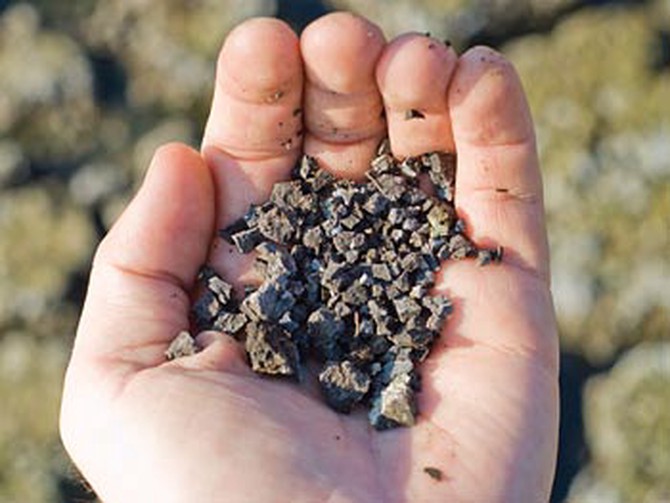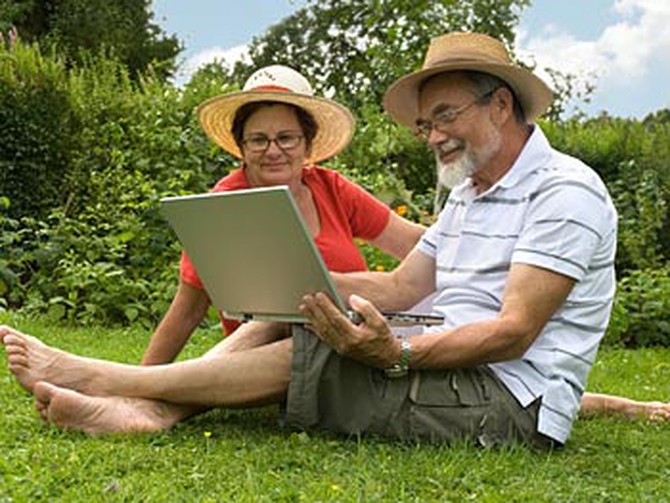10 Tips for New Gardeners
Have a little patch of earth all to yourself? A bountiful summer harvest of vegetables, fruits, flowers and herbs starts now.

Photo: © 2009 Jupiterimages Corporation
Having a little patch of earth for planting vegetables, fruit, flowers and herbs is an appealing prospect, but figuring out where to begin can be overwhelming for an inexperienced gardener. Charlie Nardozzi, senior horticulturist for the National Gardening Association, says with a little planning, knowledge and time commitment, anyone can make a garden grow. Charlie, along with David Ellis, director of communications, for the American Horticultural Society, share 10 tips every new gardener should know.

Photo: © 2009 Jupiterimages Corporation
Read Up on Gardening
Subscribe to a gardening magazine, buy a few good reference books and write down the names of plants you like, David says. By reading, writing and planning before planting season, David says you will know what kind of garden you want to grow come spring.

Photo: © 2009 Jupiterimages Corporation
Seek Local Advice
David advises talking to neighbors who have gardens, visiting garden centers and public gardens and attending lectures and classes offered by local garden enthusiasts. Also, take advantage of your local Cooperative Extension System office. Charlie says these offices can often put you in touch with a master gardener who will, free of charge, answer yard and garden questions pertaining to your region.

Photo: © 2009 Jupiterimages Corporation
Consider Your Spare Time
For maximum enjoyment, David says you should size your garden to suit your schedule. "Too large will become a burden—better to start small and expand," David says.

Photo: © 2009 Jupiterimages Corporation
Buy the Basics
Whether you're planting flowers or vegetables, Charlie suggests investing in these basic gardening supplies:
- Compost
You can buy it bagged at a gardening center or in bulk and have it delivered to your home. Compost, which is a mixture of decaying organic matter, improves the health of your soil, and Charlie says the soil is the soul of your garden.
- Mulch
"It's nice to put down a layer of mulch to keep the soil nice and moist," Charlie says. By adding mulch to your garden in the spring, you reduce some of watering, weeding and other maintenance you'll have to do in the summer, Charlie says. Depending on what's available where you live, you can use wood chips, pine straw or even stone or rock as mulch, but Charlie suggests using organic mulch that will break down into your soil and feed it over time.
- Hand tools
A basic set of gardening tools includes a three-prong cultivator that you can use to make rows, weed and perform other activities, Charlie says. Other good tools include a trowel for digging in small gardens and a dibbler, which helps to make holes in the ground for seeds and plants.
- A garden hose
Charlie suggests investing in a good hose and spray fixture for the end of the hose that releases a gentle spray when watering. Most garden hoses are made of vinyl or rubber and cost $20 to $40.
- Hat, gloves and sun protection
Any time you're out in your garden, use common sense and wear a wide-brimmed hat and long sleeves or sunblock, Charlie says. Also, a good pair of gardening gloves will keep your hands clean and protected.

Photo: © 2009 Jupiterimages Corporation
Choose a Site
Whether you're planning on planting in containers, a raised bed or an open field, David says you'll need the optimum amount of sun exposure suited to your particular plants. David says vegetables, fruit and most herbs need full sun or a minimum of six hours of sun every day. Flowers are more adaptable, and you can select species for either sun or shade. Also, you may want to consider how you will water your garden and pick a site near a water spigot for convenience, David says.
Charlie suggests placing your garden near a walkway or door where you'll see it every day. "The problem people have, especially new gardeners, is they put the garden out of the way and they forget about it," he says. By July, the garden is overgrown with weeds, may have pest problems and can be overwhelming. Charlie's advice to beginners: Keep your garden close to your house, and keep it small.
Charlie suggests placing your garden near a walkway or door where you'll see it every day. "The problem people have, especially new gardeners, is they put the garden out of the way and they forget about it," he says. By July, the garden is overgrown with weeds, may have pest problems and can be overwhelming. Charlie's advice to beginners: Keep your garden close to your house, and keep it small.

Photo: © 2009 Jupiterimages Corporation
Prepare Your Soil
As soon as the ground thaws, David says it's time to start to prepare and improve your soil with lots of organic matter, such as shredded leaves left over from fall and compost. Building good garden soil takes time, and you need to add organic matter to it every year. "Think of your soil as a garden that grows and supplies everything your plants need. Feed the soil, and it will feed your plants," David says.

Photo: © 2009 Jupiterimages Corporation
Start with Seedlings
Some plants, like tomatoes, peppers and petunias, are difficult to grow from seed, so Charlie advises buying those plants as seedlings from a local garden center. If you are serious about starting your own seedlings indoors, Charlie says you should buy a special light system to grow your seeds under instead of relying on a windowsill for light, but those are expensive and can run from $60 to several hundred dollars.

Photo: © 2009 Jupiterimages Corporation
Don't Plant Too Soon
Many people may be itching to plant in their gardens on the first mild day of spring, but Charlie says that's a mistake. "If you plant too soon, [plants] will get hit by frost and die," he says. "Also, if they have to live through the first few weeks of their lives too cold or too wet—if they survive—they may not produce as well." Check with a neighbor who gardens, a master gardener or a local botanical garden and find out when most people start planting in your area.

Photo: © 2009 Jupiterimages Corporation
Keep Garden Records
By keeping track of planting and harvesting dates, the varieties of plants you use and pests you encounter, David says you will have an valuable resource to help you pinpoint successes and avoid failures in next year's garden.

Photo: © 2009 Jupiterimages Corporation
Enjoy Yourself
You may not grow the best tomatoes on the block or award-winning roses, but David says what your garden will surely produce is a little exercise, relaxation and a chance to commune with nature. "Grow things you want to grow and things adapted to your climate," he says. "Stay small and enjoy what you have, and you'll get more exited, better at it, [and then] you'll expand."
Take this quiz and find out what kind of gardener you are!
Keep Reading
Is your soil ready for planting?
10 tips for green gardening
Organic gardening essentials
Take this quiz and find out what kind of gardener you are!
Keep Reading
Is your soil ready for planting?
10 tips for green gardening
Organic gardening essentials
Published 02/19/2009

